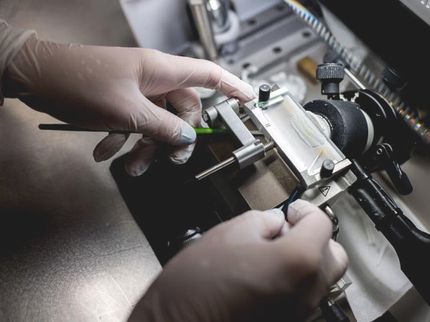New compound from blessed thistle promotes functional nerve regeneration
Researchers have found a new use for Cnicin
Blessed thistle (Cnicus benedictus) is a plant in the family Asteraceae and also grows in our climate. For centuries, it has been used as a medicinal herb as an extract or tea, e.g. to aid the digestive system. Researchers at the Center for Pharmacology of University Hospital Cologne and at the Faculty of Medicine of the University of Cologne have now found a completely novel use for Cnicin under the direction of Dr Philipp Gobrecht and Professor Dr Dietmar Fischer. Animal models as well as human cells have shown that Cnicin significantly accelerates axon (nerve fibres) growth. The study ‘Cnicin promotes functional nerve regeneration’ was published in Phytomedicine.

Dried blessed thistle (Cnicus benedictus)
Dietmar Fischer
Rapid help for nerves
Regeneration pathways of injured nerves in humans and animals with long axons are accordingly long. This often makes the healing process lengthy and even frequently irreversible because the axons cannot reach their destination on time. An accelerated regeneration growth rate can, therefore, make a big difference here, ensuring that the fibres reach their original destination on time before irreparable functional deficits can occur. The researchers demonstrated axon regeneration in animal models and human cells taken from retinae donated by patients. Administering a daily dose of Cnicin to mice or rats helped improve paralysis and neuropathy much more quickly.
Compared to other compounds, Cnicin has one crucial advantage: it can be introduced into the bloodstream orally (by mouth). It does not have to be given by injection. “The correct dose is very important here, as Cnicin only works within a specific therapeutic window. Doses that are too low or too high are ineffective. This is why further clinical studies on humans are crucial,” said Fischer. The University of Cologne researchers are currently planning relevant studies. The Center for Pharmacology is researching and developing drugs to repair the damaged nervous system.
Original publication
Other news from the department science

Get the life science industry in your inbox
By submitting this form you agree that LUMITOS AG will send you the newsletter(s) selected above by email. Your data will not be passed on to third parties. Your data will be stored and processed in accordance with our data protection regulations. LUMITOS may contact you by email for the purpose of advertising or market and opinion surveys. You can revoke your consent at any time without giving reasons to LUMITOS AG, Ernst-Augustin-Str. 2, 12489 Berlin, Germany or by e-mail at revoke@lumitos.com with effect for the future. In addition, each email contains a link to unsubscribe from the corresponding newsletter.





















































